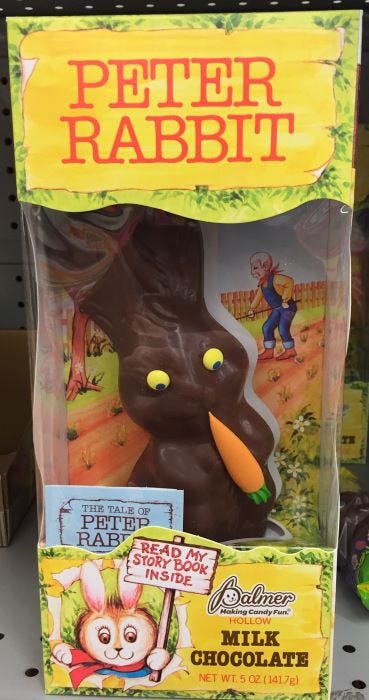Folks,
Not much Jewish news on Easter, but I won't let that stop my hunt for the most intriguing story. Enjoy. And so I can keep filling your basket, please become a paid subscriber. There's even a holiday sale.
Happy 8th Day of Passover
Edmon J. Rodman
GUIDE FOR THE JEWPLEXED
Kosher Easter bunnies hopping off the shelves
Edmon J. Rodman
Why is the Easter bunny kosher? Not the one that hops along the bunny trail. But the hollow chocolate ones, the foil wrapped ones, the ones that stare back at you out of pastel yellow and purple boxes while you are shopping for Passover.
Though it may seem at first like a kosher conundrum, many of the bunnies are kosher and have the papers to prove it.
Are the kosher bunnies some odd Passover--Easter season convergence? A hop beyond chocolate covered matzas? Or are they simply the offspring of a food manufacturing mixed marriage?
Relax. The certified bunnies are simply the result of the economics of kashrut, and the propinquity of business associates, neighbors, and friends of different religions.
Every year around Passover time, in supermarkets, drug and candy stores, kosher chocolate Easter bunnies and eggs, wait patiently on the shelves for their big Sunday. In kosher for Passover households, these items will remain on the waiting list, however, because they lack holiday specific "Kosher for Passover" approval.
Yet, turn the box around, swirl the brightly colored foil wrapped eggs, and you will see the signs, the tiny printed K’s or O U’s (Orthodox Union) indicating a kosher product, OK-ing them for consumption in kosher homes the rest of the year.
According to Kosher Food Production magazine , “roughly 40% of the retail food products sold in the United States today bear some type of Kosher certification.” And Americans spend nearly two billion each year on Easter candy, so market-wise it is not surprising there is at least some Easter and kosher confectionery congruence.
Well known and distributed manufactures such as Hershey, Palmer, See’s, and high-end producers such as Godiva, as well as several smaller producers like Lang’s Chocolates in Pennsylvania, and Jewish-owned Madelaine Chocolate Company in Long Island (established in 1949) all make kosher Easter themed chocolate products. There is even a vegan kosher bunny marketed by Farm Sanctuary.
It’s not that the bunnies are hopping off the shelves in temple gift shops and Jewish markets. Yet, according to Peter Lang of Lang’s, some Jewish customers do request them, and some Christians buy them “so they can share them with their Jewish neighbors.”
Seems the bunny, a Christian symbol of fertility and rebirth has jumped other cultural lines as well.
According to Estee Farber, marketing director for Madelaine’s, “Many wholesalers and distributors, request kosher bunnies as a sign of a certain level of quality.”
Also, it doesn't cost the candy makers any more to produce the milk or dark chocolate rabbits and eggs since the fee for kosher certification, as long there are no changes in ingredients, covers their entire chocolate production.
Farber also feels some Jewish customers want the kosher bunnies so that they can make baskets to give to their non-Jewish friends or customers.
The seasonal product cross-over continues year-round. In November, Madelaine produces foil wrapped chocolate coin Chanukah gelt right alongside the chocolate Santas.
Not that you’re wondering, but if the bunnies were real, they would never make it onto the Jewish food chain. Rabbits are traif, that is, not kosher.
Leviticus stipulates that animals such as rabbits that are not cloven footed (Rabbits run around on paws) are not to be eaten.
Not a word, however, is mentioned about the chocolate versions.





